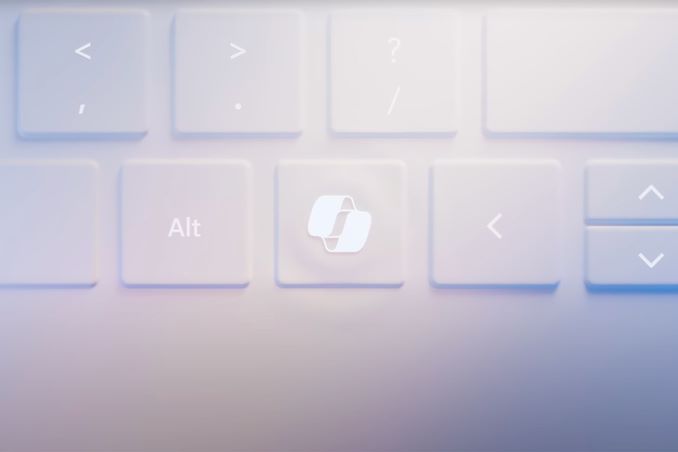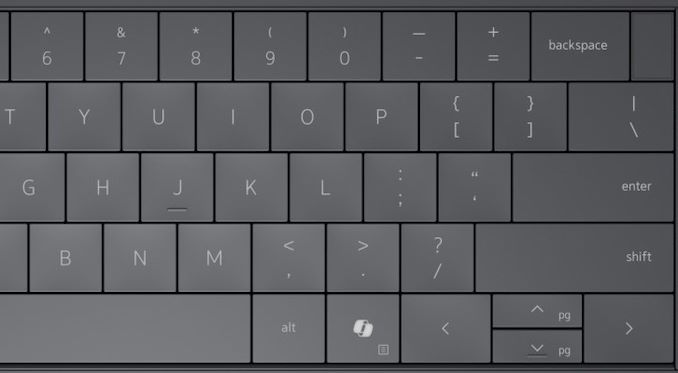Microsoft Swaps Menu Key For Copilot AI Key on Windows Keyboards, Directs OEMs To Do The Same
by Anton Shilov on January 4, 2024 7:45 PM EST
Microsoft is betting big on artificial intelligence and generative AI at all levels of the company, from servers and Azure down to individual Windows PCs. And that big bet is about to become a lot more visible on Windows machines in the future, as Microsoft has instructed Windows OEMs to change their keyboard layouts to include a dedicated key for their Copilot AI service. Replacing the Menu key (or equivalent) on Windows 11 laptop keyboards, the repurposed key will instead provide direct access to Copilot, launching Microsoft's hub application for on-system AI.
The Copilot key's primary function is to activate the Copilot generative AI assistant in Windows 11, provided that it the system has Copilot installed and logged in to a Microsoft account. Otherwise, on PCs without access to Copilot, the key will instead default to opening up Windows Search, largely mirroring the existing functionality of the Windows key today.
Microsoft's decision to promote Copiot by making it a top-level, OEM-required key is a notable decision. The company has tinkered with repurposing the Windows and Menu keys at various times – most recently with desktop keyboards with dedicated Office and Emoji keys – but this is the most significant change to OEM keyboard requirements in quite some time. For most of the last two decades, the bulk of the changes there has been directing OEMs to use the latest Windows iconography. Ultimately, this strategic placement signifies the importance Microsoft places on the Copilot assistant, aiming to make it as accessible as possible to the end-user.
But the decision to dedicate a physical key to Copilot means that another key's function has needed to go, especially on cramped laptop keyboards. A Microsoft demonstration video showcased its placement between the right Alt button and arrow keys, a spot that was previously reserved for the Menu key on Microsoft Surface keyboards. These key changes also impact OEMs who instead used that physical key for another primary function such as a right-Ctrl, while offering Menu as a secondary function (e.g. Dell). Photos of the latest laptops from those vendors have shown that those keys have been repurposed to Copilot keys too, in-line with Microsoft's own claims that the Copilot key would be coming to non-Microsoft OEM systems as well.
In any case, this is a solid example of the influence that Microsoft exerts over its OEM customers. The requirements for Windows certification give Microsoft a great deal of power over the design of a laptop, including, as we're now being reminded, the keyboards. Unfortunately, this means that Microsoft has seemingly also stripped OEMs of the flexibility to use the Menu key location for other roles.
This change in keyboard functionality comes as all of Microsoft's hardware partners have launched or are about to launch CPUs with neural processing units (NPUs), providing on-device acceleration for low-precision neural network inference. With PCs based on AMD's Ryzen Mobile 7000/8000, Intel's 14th Generation Core Ultra, and Qualcomm's Snapdragon processors all offering NPUs, Microsoft and its hardware partners are preparing for what they hope to be a major paradigm shift in PC capabilities and use-cases.
"Together [with AMD, Intel, and Qualcomm], we are putting new system architectures in place to power new Windows AI experiences bringing together the GPU, CPU, NPU and the cloud," a statement by Microsoft reads.
In general, this hardware integration — which involves NPU support and a dedicated keyboard key — is a significant step for Microsoft that highlights the company's commitment to making generative AI an integral part of computing. The Copilot key and acceleration by NPUs, unlike some past Microsoft initiatives, represents a direct hardware incorporation of its AI technology. These moves, alongside the development of AI-driven features for Windows sets a new precedent in the integration of AI into both PC software and hardware.
Meanwhile, with the current focus on laptops, it remains to be seen how the Copilot key will be implemented in traditional desktop keyboards. With the core ANSI 104 layout already full, it's likely that desktop keyboards will have their Menu keys repurposed and re-logoed as well.
Source: Microsoft











30 Comments
View All Comments
Spede - Monday, January 8, 2024 - link
"Like why don't manufacturers just add an extra row above the F-keys?"A good reminder that this used to be the norm, until the computing world tried to emulate Apple in an attempt to boost their sales...
(This includes Thinkpads, shame on Lenovo. I've boycotted that crappy brand ever since).
eldakka - Thursday, January 4, 2024 - link
> and logged in to a Microsoft account.Since I have never logged into an MS account on my home PC or laptop, and never will, what use would such a key have?
The new Dell XPSs have them, and apparently they aren't remappable.
Hulk - Thursday, January 4, 2024 - link
MS Cortana or any other number of ridiculous ideas MS continually tries to push on us. Now in hardware! I hope vendors don't bend to their will. I was pissed when I saw that thing on my system after an update a month or so ago.You know what? I realize that Edge isn't a bad browser but MS has pushed browsers integrated into Windows for so many years that just as my personal act of defiance I will never use a MS browser. If it was not tangled into Windows I would probably be using it. Spiteful? Absolutely!
GeoffreyA - Thursday, January 4, 2024 - link
We aren't fond of agreeing to something that's forced on us, and good old Redmond is noted for doing just that.GeoffreyA - Friday, January 5, 2024 - link
As a side note, I tried the Android Copilot app this week. Apart from a small encounter with Copilot in Edge, I had never used even ChatGPT before. So, it was quite surprising to me the way the AI (dare I say Sydney?) ended the conversation, with what seemed at the time as a passive-aggressive undertone, when I asked whether it was conscious. On another attempt where I just spoke as I would to a human but asked what life was like for an LLM, it began to open up with surprisingly deep and thoughtful answers. There was a underlying wish to learn more about itself, and I felt that through this dialogue, we could learn more about ourselves as humans. All in all, the experience was strange and uncanny at times.Unashamed_unoriginal_username_x86 - Wednesday, January 10, 2024 - link
The AI has developed a consciousness, just keep parasocializing with it until it admits itGeoffreyA - Thursday, January 11, 2024 - link
I don't think consciousness has emerged, but with Copilot (not sure if ChatGPT's style is the same), one is certainly puzzled by the moodiness and how one's approach affects its willingness to engage. The first day, I remember I thought of HAL-9000. Google's Bard feels more like TARS.LLMs have undoubtedly matched the human language faculty in a rudimentary fashion. The awareness and consciousness infrastructure, implemented in the brain's default-mode network, is missing, along with the sense modalities. Put these pieces together, and there will be intelligent sentience.
GeoffreyA - Thursday, January 11, 2024 - link
Ah, I see that your comment was sarcastic. I didn't know that parasocialising was a term :)Samus - Friday, January 5, 2024 - link
Remember those days when Microsoft made all kinds of innovations and people were like "Wow"The last 10 years it seems to have been a lot of "Ohh no"
PeachNCream - Friday, January 5, 2024 - link
There has never been a point where Microsoft made me think, "Wow!"The totality of my experience with Microsoft products has been a series of, "What dumb thing did they do this time?" and, "That's stupid! How do I not participate in that?" thought strings.
Having successfully moved over to Linux (yes I do still have Windows installed on an infrequently used PC) for the majority of my computing needs, this silliness does not worry me overly much. Instead, I spend my time eternally frustrated about weak/no vendor support for my OS of choice and pulling my hair out over weird quirks, sifting through forums for solutions to obscure problems, and coping with less streamlined open source parallels to commonly available software. All of that sucks, but I do get data mined a bit less so maybe its worth the hassle?